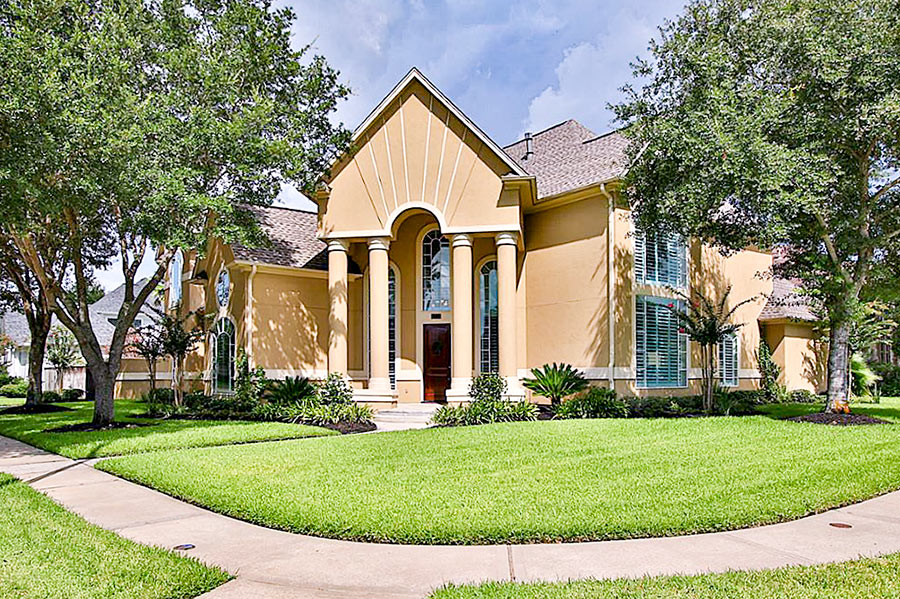WHAT MAKES WEST HOUSTON THE BERMUDA TRIANGLE OF REAL ESTATE DISCLOSURE  “None of the more than half a dozen residents interviewed by The Texas Tribune and ProPublica after the floods said they knew they were living inside Addicks or Barker — many of their neighborhoods are several miles away from the dams. Several local officials — including Houston’s ‘flood czar’ and a neighboring county executive — said they had no idea the neighborhoods had been built inside the flood pools. Several real estate agents said they didn’t realize they were selling homes inside the pools.” This from the latest exposé on how 14,000 homes came to be located in designed-to-flood areas inside the Addicks and Barker reservoirs. First, the good news: Of those 14,000 homes, only 5,138 of them flooded this time! Among the many additional OMG-worthy revelations from this latest report from the crack Houston-flooding investigations team of Neena Satija, Kiah Collier, and Al Shaw: Of those homes built inside the reservoirs, at least 4,000 of them were built after Tropical Storm Allison hit in 2001. That’s interesting to note, considering that a Harris County Flood Control District report published in 2003 warned that as many as 2,000 acres of private land inside the reservoirs might easily have flooded in that storm if the rains had fallen in a slightly different location. Also included: this little glance at the area’s real-estate future: “One five-bedroom home in Lakes on Eldridge . . . was listed for $678,000 about two weeks before it flooded during Harvey. The seller’s agent, Moira Holden, tried to put a positive spin on things when she updated the online listing that decreased the asking price by $10,000. ‘Unfortunately this stunning home did flood and is being refurbished to the highest spec!’ it says. ‘Fabulous chance to choose your finishes!‘ When asked if she would disclose to potential buyers that the home was inside Addicks Reservoir, Holden didn’t have a clear answer. ‘I will obviously disclose whatever we are required to disclose,’ she said, pointing out that the home wasn’t in a floodplain. ‘I would hope that the buyer’s Realtor would do their due diligence on that.'” [Texas Tribune; previously on Swamplot] Photo of 13119 Shermons Pond, for sale in Lakes on Eldridge: HAR
“None of the more than half a dozen residents interviewed by The Texas Tribune and ProPublica after the floods said they knew they were living inside Addicks or Barker — many of their neighborhoods are several miles away from the dams. Several local officials — including Houston’s ‘flood czar’ and a neighboring county executive — said they had no idea the neighborhoods had been built inside the flood pools. Several real estate agents said they didn’t realize they were selling homes inside the pools.” This from the latest exposé on how 14,000 homes came to be located in designed-to-flood areas inside the Addicks and Barker reservoirs. First, the good news: Of those 14,000 homes, only 5,138 of them flooded this time! Among the many additional OMG-worthy revelations from this latest report from the crack Houston-flooding investigations team of Neena Satija, Kiah Collier, and Al Shaw: Of those homes built inside the reservoirs, at least 4,000 of them were built after Tropical Storm Allison hit in 2001. That’s interesting to note, considering that a Harris County Flood Control District report published in 2003 warned that as many as 2,000 acres of private land inside the reservoirs might easily have flooded in that storm if the rains had fallen in a slightly different location. Also included: this little glance at the area’s real-estate future: “One five-bedroom home in Lakes on Eldridge . . . was listed for $678,000 about two weeks before it flooded during Harvey. The seller’s agent, Moira Holden, tried to put a positive spin on things when she updated the online listing that decreased the asking price by $10,000. ‘Unfortunately this stunning home did flood and is being refurbished to the highest spec!’ it says. ‘Fabulous chance to choose your finishes!‘ When asked if she would disclose to potential buyers that the home was inside Addicks Reservoir, Holden didn’t have a clear answer. ‘I will obviously disclose whatever we are required to disclose,’ she said, pointing out that the home wasn’t in a floodplain. ‘I would hope that the buyer’s Realtor would do their due diligence on that.'” [Texas Tribune; previously on Swamplot] Photo of 13119 Shermons Pond, for sale in Lakes on Eldridge: HAR





She didn’t know it was in a flood plain… Well, I hate to say this but everything is a flood plain. It’s just in a lower risk flood plain. This terminology has to stop. It’s deceptive and agents that tell buyers their homes are not in flood plains should be sued for misleading info.
I’m…
So….
Over….
Dumb…..
Realtors….
“I would hope that the buyer’s Realtor would do their due diligence on that.†Basically, “for me to know and for you to find out the hard wayâ€. Scummy realtors will lie through their teeth every time, code of ethics be damned.
#SayNoTo6%
Caveat Emptor.
Repeat it with me: Caveat Emptor.
Truly homebuyers need to do their own research.
But home-buying is a very emotional thing – one falls in love with the house, the location, the promise of an awesome future life… so, unfortunately, wariness seldom enters into the transaction.
Nice work on the article, but like others of the same kind they seem to singularly focus on government entities such as the Corps and County, as well as Realtors. When is someone going to do a developer-focused investigative piece? There is plenty of blame to be put on developers who built homes inside the flood pools, including American General/AIG/Mischer (Cinco Ranch), Kickerillo (Kelliwood, Twin Lakes), Ryko (Lakes on Eldridge), and Land Tejas (Canyon Gate). Where is the outrage with them?
There is a special place in hell for the developers who didn’t disclose anything about the properties they sold. For the folks in Canyon Gate, however, some of the blame lies with them. If you walk out of your house, look South, and can see the inside of a dam, you should be asking yourself “do I need flood insurance, since I live inside a dam?”.
So this realtor who is selling the Lakes on Eldridge property stands to commission a bit over $20,000 off this gem. Yet she doesn’t seem to know where it sits is a danger, and doesn’t have the ethics to disclose pertinent details. What exactly does she do to warrant paying her $20K?
@movocelot
“Truly homebuyers need to do their own research.”
I’m in the market for a new place. Where can I find if the house was flooded or is otherwise in a compromised zone? It appears in Harris County such information wasn’t recorded or readily available. Thanks.
I think this all goes back to a lack of basic earth science and map reading in high schools. The problem is, even with relatively easy access to flood maps and elevation maps, few people understand what they are looking at and their relative risk. 100 year and 500 year flood maps (and flood risks) are not the simple concepts their descriptions imply.
Relying on seller’s disclosure of flood risk is a really bad plan in this town (even without scummy realtors). I’d be surprised that, even if disclosed by the first flooded owner, that by the 2nd or 3rd without flooding, that would mysteriously no longer appear on a disclosure. Ignore the maps for a moment, if the house is built in such a way as (and in a neighborhood where) it would have originally had hardwood floors, and it doesn’t, it has flooded. There are a few other very clear tells, but this is a buyer beware scenario
“None of the more than half a dozen residents”
So, they asked like 7 or 8 people? Not much of a sample size.
She’s only knocking $10,000 off the price for a flooded home? Oh, boy, the buyers will get to “pick their own finishes.” Talk about making a silk purse out of a sow’s ear! Then she hems and haws about whether or not the property is in a flood plain. I had a low opinion of realtors before, but this one really takes the cake. Developers of those Addicks/Barker homes also buried the flood warning in the subdivision plats, where nobody would see them.
As for flooding disclosures, unfortunately, many people lie. A woman bought a condo in my complex last year, which then flooded in the Tax Day storm. When the HOA board informed her the unit had also flooded in 2001 and 2015, she was shocked, because it was NOT disclosed on the contract. I’m sure this happens a lot, and makes it even harder for buyers to ascertain the truth about a property’s flooding history.
Look up the fault lines that run through the city. The “Long Point” fault line is like 10 miles long…
I’m with movocelot – caveat emptor. Your job as buyer is to challenge everything and trust no one. More transparency = one more addendum and release to the stack of paperwork the home buyer shuffles through at closing. There is a demand side to the equation folks, for every greedy builder and slimeball realtor out there, there is a stupid buyer willing to stick their head in the sand when things clearly don’t add up.
The sad part is that realtors have no liability for their lies and concealment of facts. If people sued realtors more for constant material losses because of their incompetence and outright malicious actions, then the whole industry one day might change.
I suppose a glimmer of hope is that the entire profession is being replaced by an App.
Thanks for the tip, Bocephus. I didn’t know that about our local geology.
To other’s points, I moved to Houston in 2002 and bought a house in 2006. Did I consult flood plain maps before hand? Absolutely. Although slightly before my arrival, Allison was still in the back of my mind. FWIW, I bought flood insurance for the first time before the storm season arrived as there has been considerable development of land in the neighborhood and swales are getting covered or blocked with debris. It was about $450. Our swales ran high but they never flooded.
As of today Google map in satellite image shows that this area in Lakes on Eldridge is submerged in water. Comparing this image with Zillow, I started to figure out what the sellers/realtors mean by “Did not flood.â€
According to Zillow, there is a home for sale at 735K in Lakes on Eldridge that says “DID NOT FLOOD.†Looking at its airial view in Google map, it’s actually flooded to me.
There is another home for sale at $379K nearby. It says “HOME DID NOT FLOOD.†So this is what they meant. What did not flood was the “home.†Google map shows that this home is in water at its front.
Another home is for sale at $990K. It reads “priced to reflect flood damageâ€. $990K! when Zestimate is $669K! when the photos in Zillow show the extended flood damages in this house!
All these are not only for Lakes on Eldridge alone.
Buyers must play smart.
Michelle – Zestimates are worth nothing in Texas, as this is a non-disclosure state and sales prices are not public. You could better ask your 9 year old cousin to do the valuation.
@CommonSense
Right there with you on the realtors. I have a duplex I’m considering selling, but I just can’t get past the realtor fees, and am looking at FSBO. I just don’t believe they earn those 6% commissions any longer. I don’t think it takes five times the energy, time, or marketing to sell a $500,000 v. $100,000 listing. I’ve asked several realtors how they justify that 6% commission, and haven’t gotten a valid answer yet. What’s the name of the app to which you refer?